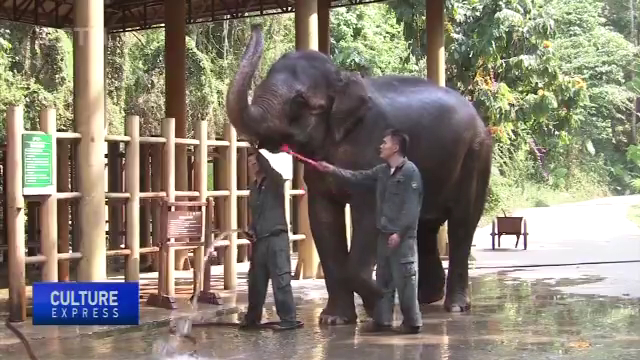
18:34, 22-Apr-2019
Protecting Endangered Species: The battle to save wild Asian elephants in Xishuangbanna
Updated
18:30, 25-Apr-2019
03:31

Monday is the 49th World Earth Day. Warning signals abound as the world takes account of the impact people have made on the environment. One example: Wild Asian elephants, with a population of about 300, are under class-A protection in China. The country's wildlife protection law forbids the poaching of endangered species, but problems persist in Xishuangbanna, the main habitat of wild Asian elephants in China. CGTN's Xu Mengqi has more.
It was a critical moment for 3-year-old young elephant Ranran. Her wound in the leg, caused by an iron clamp trap, was fatal. To properly treat the injury, rescue workers had to take her away from her herd to save her life. Ranran survived.
XIONG CHAOYONG, ELEPHANT CONSERVATIONIST YUNNAN ASIAN ELEPHANT BREEDING AND RESCUE CENTER "At the time, Ranran's wound had severely festered. The cut in the shape of a ring was 20 centimeters deep and you could already see the bones. If we had rescued her a few days later we would have lost her."
Xiong Chaoyong used to be a captive elephant keeper, but the encounter with Ranran in 2005 transformed him into an adamant conservationist of wild elephants.
XIONG CHAOYONG, ELEPHANT CONSERVATIONIST YUNNAN ASIAN ELEPHANT BREEDING AND RESCUE CENTER "We have pulled these elephants back from the brink of death. Every day when I come into work, I see them act as if they are excited to see me, as if they are welcoming me. I feel something hard to describe. I feel proud."
Xishuangbanna, in China's southwestern Yunnan province, is the country's main habitat for wild Asian elephants. To better preserve the endangered species, China's forestry administration launched an Asian elephant breeding and rescue center here in 2008. Since saving Ranran, Xiong Chaoyong and his fellow workers have tended to more than 10 other wild elephants.
MS. LIU LOCAL VILLAGER "It's a mixture of hate and fear, honestly."
Several kilometers away from the rescue center, villagers have a different story to tell about wild elephants.
MS. LIU LOCAL VILLAGER "I hate them because they eat all my crops, but they are under state protection, so I don't dare to hurt them either."
Raiding crops, causing casualties. Human-elephant tension, according to Shen Qingzhong, an expert on wild Asian elephants, has worsened in Xishuangbanna in recent years.
SHEN ZHONGQING, CHAIRMAN XISHUANGBANNA ASSOCIATION OF ASIAN ELEPHANT PROTECTION "Objectively speaking, elephants' habitat is shrinking. Since the forest tenure reform in the 1980s, the way locals farm has changed, and a lot of villagers switched to growing trees with economic value, such as rubber and tea. These forests cannot provide food for elephants so that in one way explains the conflict."
Back at the rescue center, Xiong Chaoyong often contemplates: Will the elephants he once saved be accepted by their herds when they return to the wild; and will they survive another round of conflict with humans? For now, he doesn't have an answer, but for his beloved elephants, he is willing to be patient for as long as it takes. XMQ, CGTN, Xishuangbanna, Yunnan province.

SITEMAP
Copyright © 2018 CGTN. Beijing ICP prepared NO.16065310-3
Copyright © 2018 CGTN. Beijing ICP prepared NO.16065310-3